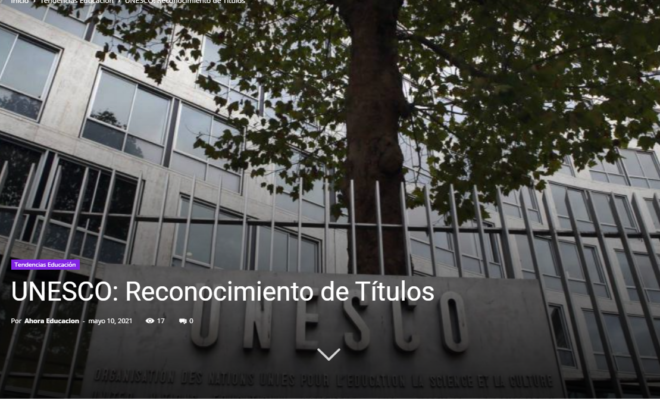What is the Global Convention on higher education? / UNESCO


Imagine a world where students can swiftly move around the world and pursue their studies without hitting any roadblocks. Well we might be one step closer to that. In November 2019, the draft text of the future Global Convention on the Recognition of Qualifications concerning Higher Education will be submitted to UNESCO’s General Conference for adoption. Once approved, the Global Convention will be the first legally binding United Nations treaty on higher education. But what exactly is the Global Convention?
What is the Global Convention?
The Global Convention on the Recognition of Qualifications concerning Higher Education will be a binding agreement. It will join the ranks of other UNESCO conventions, such as the cultural conventions and the convention against doping in sport.
The Global Convention will be the first of its kind in the UN on higher education with a global scope, and will complement the five UNESCO regional conventions on the recognition of higher education qualifications.
Built on the existing regional conventions, the Global Convention will create a framework for fair, transparent and non-discriminatory recognition of higher education qualifications. The novelty of the Global Convention is that it opens for inter-regional academic mobility, and puts into place universal principles for improving recognition practices.
Under certain conditions, the Convention will be open for countries, which wish to be committed to its text.
What are the benefits of this future Convention and how will it help students?
Today more than 4 million students study outside their home country and it is estimated that by 2020 around 8 million students will be studying abroad. The Global Convention is designed to facilitate academic mobility between regions. It will mainly benefit people who are seeking recognition of their qualifications in another region than their home region, for either accessing higher education or continuing their studies.
For example, it will become easier for a student to have their high school diplomas recognized in another region in order to pursue his/her studies there. It will also facilitate for a student, who wants to complete a degree in other country based on studies that he/she had started elsewhere.
The Global Convention will also provide platforms for national authorities to collaborate across borders and regions to develop better tools and practices for the recognition of higher education qualifications.
What exactly is UNESCO’s role?
UNESCO serves as a global platform for discussion on the recognition of higher education qualifications and the promotion of academic mobility. Being the only UN agency with a mandate in higher education, the new Convention is part of UNESCO’s technical support to review higher education strategies and policies in countries that decided to be committed to its text. The aim of this support is to improve equitable access to quality higher education and enhance mobility and accountability.
UNESCO will be the secretariat of the mechanism to be set to ensure and monitor the implementation of the Convention’s text (“Intergovernmental Conference of Parties”). This implementation mechanism body will meet every two years and will provide guidance (recommendations, guidelines and share good practices) to the countries committed to the Convention (“State party”) and have to follow the obligations established in its text.
How will the Convention contribute to more inclusive higher education systems?
For the countries, which decides to be legally committed to the Convention’s text, The Global Convention will be a strong instrument to prevent brain drain, since these countries are engaged to put in place mechanisms to facilitate the recognition in their countries of degrees or studies obtained abroad.
The Convention will also help migrants to access higher education in their new home countries, since it obliges to put in place mechanisms to facilitate the recognition of refugees’ qualifications, even for those who cannot provide any documentary evidence of their qualifications.
What has been the process of developing the new Global Convention?
The idea of a Global Convention has been on UNESCO’s agenda for a long time. The formal process started in 2011 after a feasibility study had underlined the urgent need for a Global Convention to respond to the need for improved recognition of foreign qualifications worldwide. For this purpose, UNESCO established a drafting committee in 2016 consisting of experts from all regions that finalized a preliminary draft in June 2017.
The draft was then circulated among Member States for comments between 2017 and 2018, and UNESCO presented a revised draft for discussion at two intergovernmental meetings that took place in December 2018 and March 2019.
At the March meeting, more than 260 technical and legal experts from around 150 Member States approved the draft. It has now been submitted for adoption at UNESCO’s 40th Session of the General Conference in November 2019.
Article originally published by UNESCO
Read about the Regional Convention of Higher Education
RELATED ITEMS








